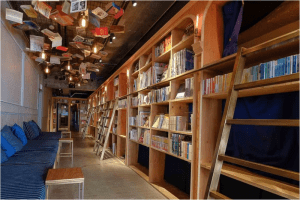
Learning to Go with the Flow When You Travel
Traveling is more than just visiting new places and experiencing different cultures. It is an opportunity for personal growth and learning. One of the most valuable skills you can acquire while traveling is the ability to adapt and go with the flow. In an ever-changing world, being able to adapt to unexpected situations is crucial, and traveling provides the perfect setting to practice and master this skill.
When you travel, you are bound to encounter situations that are different from what you are used to. Whether it’s navigating through a foreign city or trying local cuisine, each new experience requires a certain level of adaptability. As you learn to go with the flow, you will discover that embracing new experiences and stepping out of your comfort zone opens up a world of possibilities.
Adaptation while traveling goes beyond just being open to new experiences. It also involves being flexible and resilient in the face of challenges. The ability to quickly adjust your plans and expectations can turn a potential disaster into a memorable adventure. By embracing the unexpected and allowing yourself to be guided by the currents of the journey, you might stumble upon hidden gems and make connections with locals that you would have otherwise missed.
Learning to go with the flow when you travel also teaches you valuable life lessons. It reminds you that sometimes things don’t go according to plan, and that’s okay. It teaches you to appreciate the beauty of spontaneity and the joy of embracing the unknown. By surrendering to the flow of the journey, you learn to trust yourself and the world around you. You become more adaptable, tolerant, and open-minded, qualities that will not only enhance your travels but also enrich your everyday life.
In conclusion, learning to go with the flow when you travel is a valuable skill that can lead to personal growth and enriching experiences. It allows you to embrace new situations, be flexible in the face of challenges, and appreciate the beauty of spontaneity. So next time you embark on a journey, remember to keep an open mind, be flexible, and let the currents of the journey guide you to new and exciting destinations.
Exploring the Art of Adaptation
When we travel, we often encounter unexpected challenges and changes in plans. It is in these moments that we must learn to go with the flow and adapt to our new circumstances. The art of adaptation involves embracing the unknown and finding creative solutions to hurdles that arise along our journey.
Adapting to different cultures and customs is an essential part of travel. Each destination has its own unique traditions and way of life, and by immersing ourselves in these experiences, we can gain a deeper understanding of the world around us. The ability to adapt allows us to connect with locals, try new foods, and participate in activities that we may have never considered before.
Going with the flow also means being open to changing our plans at a moment’s notice. Whether it’s a sudden change in weather or a transportation delay, being flexible and adaptable enables us to make the most of our travel experiences. Instead of becoming frustrated or upset, we can choose to embrace the unexpected and find alternative paths to continue our journey.
Exploring the art of adaptation while traveling teaches us valuable life skills that extend far beyond our time on the road. It teaches us patience, resilience, and the ability to navigate unfamiliar territory. By learning to adapt and go with the flow, we become more adaptable and open-minded individuals, ready to face whatever challenges life throws our way.
The Importance of Going with the Flow
When we travel, we often have a set itinerary or plan in mind. We book flights, hotels, and tours well in advance, hoping that everything will go smoothly. However, no matter how well we plan, surprises can occur, and it’s important to be able to go with the flow.
Going with the flow when we travel means being flexible and adaptable. It means being open to new experiences and embracing the unknown. Learning to go with the flow allows us to make the most of our travel experiences, regardless of whether they match our initial expectations.
Traveling is a learning experience, and going with the flow is an important part of that learning process. It teaches us to be patient, to problem-solve, and to find joy in unexpected situations. It helps us to grow as individuals and to develop valuable life skills.
By going with the flow, we can also create more meaningful connections with the people we meet along the way. When we let go of our rigid plans and expectations, we become more open to the experiences and perspectives of others. This fosters a spirit of collaboration and helps us to build positive relationships.
In conclusion, going with the flow when we travel is essential for a fulfilling and enriching experience. It allows us to embrace the unexpected and make the most of every opportunity that comes our way. So, next time you travel, remember to go with the flow and let the journey unfold naturally.
Learning to Adapt when You Travel
Traveling is not just about visiting new places and seeing new sights, it’s also about learning to adapt to different situations and cultures. When you go on a trip, you are exposed to new experiences and challenges that can help you grow and develop as a person.
One of the most important skills to learn when you travel is the ability to go with the flow. Things might not always go according to plan, and being able to adapt and make the best out of unexpected situations is key. Whether it’s a delayed flight, a language barrier, or a change in itinerary, learning to embrace the unexpected can turn a potential setback into a valuable learning experience.
Another aspect of learning to adapt when you travel is being open-minded. Each new place you visit has its own unique culture, customs, and traditions. By being open to new experiences and ideas, you can enrich your understanding of the world and gain a deeper appreciation for different ways of life.
Learning about and respecting local customs is also essential when you travel. By understanding and following local norms, you not only show respect for the culture you are visiting but also improve your overall travel experience. Whether it’s dressing appropriately, learning a few words in the local language, or understanding table etiquette, these small gestures can go a long way in fostering positive interactions with locals and making your time abroad more enjoyable.
In addition to these skills, travel offers countless opportunities for learning and personal growth. From navigating new transportation systems to trying new foods, every experience presents a chance to step outside of your comfort zone and learn something new about yourself and the world around you. So, embrace the unknown, be flexible, and let the journey teach you valuable lessons along the way.
Embracing Change and Uncertainty
In the world of travel, embracing change and uncertainty is key. When we go on a journey, we must be prepared for unexpected twists and turns that can alter our plans and take us on a different path than we initially intended. Being open to the flow of travel means being able to adapt and adjust when things don’t go according to plan.
Embracing change means letting go of rigid expectations and allowing ourselves to go with the flow. It means embracing the unknown and being comfortable with uncertainty. Instead of resisting change, we can choose to view it as an opportunity for growth and exploration. When we open ourselves up to new possibilities, we can discover unexpected treasures and create unique experiences.
Going with the flow doesn’t mean being passive or giving up control. It means being flexible and adaptable, able to shift our plans and adjust our expectations as needed. It requires us to trust in the process and to have confidence in our ability to navigate whatever comes our way. By embracing change and uncertainty, we can truly immerse ourselves in the magic of travel and fully appreciate the beauty and diversity of the world.
Staying Open to New Experiences
When we go on a journey, whether it be to a new city or a different country, we have the opportunity to learn and grow. Traveling is not just about visiting tourist attractions and taking pictures; it is a chance to expand our horizons and gain new insights. It is a continuous process of learning and adapting to new environments.
In order to make the most out of our travels, we must be open to going with the flow. This means being flexible and adaptable to unforeseen circumstances or changes in plans. It may mean letting go of our preconceived notions or expectations and embracing the unknown. By doing so, we allow ourselves to fully immerse in the experience and appreciate the beauty of serendipity.
Learning to go with the flow requires a certain level of self-awareness and mindfulness. It is about being present in the moment and embracing whatever comes our way. It involves letting go of control and surrendering to the natural rhythm of life. Sometimes, the most memorable experiences happen when we least expect them, and by staying open, we allow ourselves to fully enjoy the journey.
In conclusion, staying open to new experiences is an essential part of traveling. By learning to go with the flow, we can embrace the unexpected and make the most out of every moment. So, the next time you embark on a journey, remember to stay open and let the currents of adventure guide you.
Overcoming Language Barriers
When you go on a journey, one of the biggest challenges you may encounter is the language barrier. Learning the local language can greatly enhance your travel experience, allowing you to communicate with the locals and immerse yourself in the culture. However, it is not always possible to learn the language of every country you visit.
Learning a few key phrases can go a long way in breaking down the language barrier. Basics such as greetings, please, thank you, and numbers can help you navigate your way through daily interactions, whether it’s ordering food, asking for directions, or negotiating prices at a market. It shows your effort to connect and communicate, which is often appreciated by locals.
Travelers can also rely on technology to help bridge the gap. Language translation apps and devices can be invaluable tools when faced with a language barrier. From translating menus to having conversations in real-time, these tools can help you communicate and navigate through unfamiliar situations.
Another way to overcome the language barrier is to embrace non-verbal communication. It’s amazing how much can be conveyed through body language, gestures, and facial expressions. Learning to read and interpret these cues can help you understand and be understood, even without speaking the same language.
In some cases, learning the local language might not be feasible or necessary. Many popular travel destinations have a high level of English proficiency, making it easier for English-speaking travelers to get by. However, it is still important to approach interactions with respect and an open mind, as not everyone may be fluent in English.
Adapting to Different Cultures

When we travel, we expose ourselves to a world of different cultures, each with its own unique traditions, customs, and ways of life. Adapting to these cultures is an important skill to have in order to fully appreciate and immerse ourselves in the places we visit.
One of the key aspects of adapting to different cultures is being open to new experiences and going with the flow. This means being flexible and willing to embrace the unfamiliar. Whether it’s trying new foods, participating in local customs, or learning a few basic phrases in the local language, going with the flow allows us to connect with the people and the culture in a more authentic way.
Another important aspect of adapting to different cultures is showing respect for local customs and traditions. This can include dressing appropriately, observing local customs and etiquette, and being mindful of cultural sensitivities. By doing so, we not only show respect for the local culture, but also avoid inadvertently causing offense or misunderstanding.
Adapting to different cultures also requires a willingness to learn and understand the history, values, and beliefs of the places we visit. This can involve visiting museums, historical sites, and cultural events, as well as engaging in conversations with locals. By gaining a deeper understanding of the culture, we can better appreciate and connect with it.
In summary, adapting to different cultures is an essential skill for any traveler. By being open to new experiences, showing respect for local customs, and learning about the culture, we can fully immerse ourselves in the places we visit and truly appreciate the diverse beauty of our world.
Navigating Transportation Challenges
When it comes to travel, learning to adapt to transportation challenges is essential. Whether you are navigating through a busy airport, dealing with flight delays, or trying to find your way on public transportation in a foreign city, being able to go with the flow is crucial.
One key aspect of adapting to transportation challenges is having a flexible mindset. It is important to remember that things may not always go as planned. Flights get delayed, trains get canceled, and buses don’t always run on time. By embracing the unexpected, you can minimize stress and make the most of your travel experience.
Another crucial skill in navigating transportation challenges is being prepared. Do your research ahead of time and familiarize yourself with the transportation options available at your destination. This could include understanding the local public transportation system, knowing how to use ride-sharing apps, or having a backup plan in case your original mode of transportation falls through.
Additionally, having a backup plan can help you navigate transportation challenges. This could mean having alternative routes in mind, knowing where the nearest taxi stand or rental car office is, or being prepared with a list of local transportation services that you can call in case of emergencies.
Lastly, it is important to stay calm and be patient when faced with transportation challenges. Getting frustrated and angry will only make the situation worse. Instead, take a deep breath, remind yourself that delays and hiccups are part of travel, and find ways to make the most of the extra time you have. Perhaps use the time to explore the airport or train station, catch up on work or entertainment, or simply relax and enjoy the moment.
Dealing with Weather Changes
When learning to go with the flow during travel, one of the key elements to adapt to is weather changes. No matter how well you plan your trip, you can never fully predict the weather conditions at your destination. It is important to be prepared and flexible to make the most out of your travel experience.
One strategy to deal with weather changes is to pack versatile clothing that can be layered. This allows you to adjust your outfit according to the temperature or weather conditions. It’s always a good idea to include items such as a lightweight jacket, a hat, and a scarf in your travel wardrobe. These items can be easily added or removed to accommodate different weather situations.
Another way to adapt to weather changes is to research the climate and weather patterns of your destination beforehand. This will give you an idea of what to expect and help you plan your activities accordingly. For example, if you know that the weather is usually rainy during certain months, you can plan indoor activities or have a backup plan for outdoor activities.
Being flexible with your itinerary is also important when dealing with weather changes. If you had planned to spend the day exploring outdoor attractions but the weather turns out to be unfavorable, be open to changing your plans. Look for indoor alternatives, such as visiting museums or trying local cuisine. This way, you can still make the most of your trip while staying comfortable.
In conclusion, learning to go with the flow when it comes to weather changes during travel is essential. Packing versatile clothing, researching the climate, and being flexible with your itinerary are key strategies to adapt and make the most out of your travel experience.
Managing Your Expectations
When it comes to travel, learning to manage your expectations is crucial. No matter how well you plan, things can and will go wrong. That’s just the reality of travel. The key is to go with the flow and adapt to whatever comes your way.
One of the most important lessons to learn is to be flexible. Don’t expect everything to go exactly according to plan. Embrace the unpredictability and be open to new experiences. This mindset will help you make the most of any situation and create lasting memories.
Another important aspect of managing your expectations is to do your research. Before you travel to a new destination, take the time to learn about the local culture, customs, and etiquette. This will help you avoid any potential misunderstandings or cultural faux pas.
It’s also important to have realistic expectations about what you can and cannot control. While you may have a general idea of what you want to see and do, it’s important to remember that not everything will go according to plan. Instead of being disappointed, embrace the unexpected and see it as an opportunity for adventure.
Lastly, don’t forget to be patient. Things may not always go as quickly or smoothly as you would like, but getting frustrated won’t help. Take a deep breath, remind yourself that you’re on an adventure, and appreciate the journey.
Finding Comfort in the Unfamiliar
When we travel, we often find ourselves in new and unfamiliar environments. It can be overwhelming at first, as we navigate through different cultures, languages, and customs. However, it is in these moments of unfamiliarity that we can truly find comfort in the flow of new experiences.
Going with the flow when we travel means embracing the unknown and being open to learning from our surroundings. It means stepping out of our comfort zones and allowing ourselves to be challenged and transformed by the unfamiliar. This type of learning can be powerful and transformative, as it exposes us to new perspectives and ways of life.
One way to find comfort in the unfamiliar is by being open to new ideas and ways of doing things. This can be as simple as trying new foods or engaging in conversations with locals. By immersing ourselves in the local culture, we can gain a better understanding of the people and their customs.
Another way to find comfort in the unfamiliar is by being adaptable and flexible. Travel rarely goes as planned, and unexpected challenges and detours can arise. By learning to go with the flow and adapt to these changes, we can navigate through the unfamiliar with ease and grace.
Overall, finding comfort in the unfamiliar is about embracing the unknown and being open to new experiences. It is about recognizing that learning can happen in the most unexpected places and that travel can be a transformative journey of self-discovery. So next time you find yourself in an unfamiliar environment, remember to go with the flow and embrace the beauty of the unknown.
Seeking Flexibility in Your Plans
When it comes to travel, learning to go with the flow is an essential skill. No matter how well you plan your trip, there are always unexpected twists and turns along the way. Embracing flexibility allows you to adapt to these changes and make the most of your journey.
A key part of seeking flexibility in your plans is being open-minded. Instead of sticking strictly to your itinerary, be willing to explore new opportunities that may arise. This could mean stumbling upon a hidden gem that wasn’t on your original list of places to visit or trying a local delicacy that you hadn’t anticipated.
Another aspect of flexibility is being prepared for the unexpected. While it’s important to have a general plan in place, leaving room for spontaneity can lead to amazing experiences. Whether it’s stumbling upon a lively festival or meeting interesting locals who offer unique perspectives, embracing the unknown can add a whole new dimension to your travels.
Flexibility also means embracing the concept of “going with the flow”. Instead of getting frustrated or upset when things don’t go as planned, remind yourself that travel is an adventure. Embrace the twists and turns, and see them as opportunities for growth and learning.
In conclusion, seeking flexibility in your plans is crucial for a fulfilling and enriching travel experience. By being open-minded, prepared for the unexpected, and willing to embrace the unknown, you can make the most of every moment and create memories that will last a lifetime.
Cultivating Resilience and Patience
When it comes to travel, there is always an element of uncertainty. No matter how much planning and preparation you put into your trip, there are bound to be unexpected challenges and obstacles along the way. Learning to go with the flow and adapt to these changes is crucial in cultivating resilience and patience.
Travel is a learning experience in itself. It teaches you how to navigate unfamiliar surroundings, communicate with people from different cultures, and problem-solve on the go. Every new destination brings its own set of lessons, and being open to these opportunities for learning is a key part of cultivating resilience.

Going with the flow is not always easy. It requires letting go of control and embracing the unknown. This can be a challenging mindset to adopt, especially for those who prefer structure and predictability. However, by embracing the unexpected and being open to new experiences, you allow yourself to grow and adapt in ways you never thought possible.
Patience is another important quality that can be cultivated through travel. Delays, language barriers, and cultural differences can test even the most patient individuals. However, by practicing patience, you learn to accept that things don’t always go according to plan and that it’s okay to slow down and embrace the present moment.
One way to cultivate patience is by immersing yourself in the local culture. Take the time to observe and learn from the locals, who often have a different sense of time and priorities. Embracing their way of life can help you develop a greater appreciation for the present moment and a more patient outlook.
In conclusion, travel is a powerful tool for learning and personal growth. By embracing the unknown, adapting to new situations, and cultivating patience, you can become a more resilient and open-minded individual. So, the next time you plan a trip, remember to go with the flow and see where the journey takes you.
Making Connections with Locals
When you go with the flow and travel to new places, one of the most rewarding experiences is making connections with locals. These interactions can lead to meaningful friendships and provide you with a deeper understanding of the culture and traditions of the place you are visiting.
One way to connect with locals is by immersing yourself in the community. Take the time to visit local markets, parks, or cafes, where you can engage in conversations with people and get a feel for the authentic way of life in that area. By being open and friendly, you can create opportunities to learn from the locals and share your own experiences.
Another way to connect with locals is by participating in community events or joining local clubs or organizations. This allows you to meet people who share similar interests and passions. Whether it’s joining a hiking group, a cooking class, or a volunteer organization, these activities provide a common ground for building relationships and fostering cultural exchange.
It’s also important to be respectful of local customs and traditions. By showing an interest in and respecting the local way of life, you demonstrate your willingness to learn and adapt to different cultures. This can help you establish a genuine connection with locals and make them more inclined to share their knowledge and experiences with you.
Finally, don’t be afraid to step out of your comfort zone and initiate conversations with locals. Whether it’s asking for recommendations on where to eat or striking up a conversation with a stranger, these small acts of reaching out can lead to meaningful connections. Remember, everyone has a story to tell, and by listening and engaging with locals, you can gain a unique perspective and learn more about the place you are visiting.
Overall, making connections with locals is an essential aspect of the travel experience. By embracing the opportunities to engage with the community, you not only enhance your own journey but also contribute to a deeper understanding and appreciation of the destination. So, go with the flow, be open-minded, and embrace the chance to make lasting connections wherever you travel.
Embracing Spontaneity
When we travel, we often find ourselves swept up in the flow of new experiences and unfamiliar surroundings. Embracing spontaneity allows us to fully immerse ourselves in the journey, creating memories and connections that go beyond the guidebook. By learning to let go and embrace the unknown, we open ourselves up to a world of possibilities.
Travel is a constant teacher, and one of the lessons it teaches us is how to adapt and go with the flow. We learn to navigate unexpected detours, adapt to changing plans, and find beauty in the unplanned moments. The ability to embrace spontaneity not only enriches our travel experiences, but also extends into other aspects of life, teaching us to be more flexible and resilient.
Learning to embrace spontaneity is not always easy, especially for those of us who thrive on structure and routine. However, it is through stepping outside of our comfort zones that we can truly grow and learn. Stepping into the unknown allows us to push our boundaries and discover new sides of ourselves.
Embracing spontaneity also means being open to new perspectives and ideas. It means saying yes to unfamiliar foods, engaging in conversations with strangers, and being open to unexpected opportunities. It is through these moments of spontaneity that we often find the most meaningful connections and experiences.
So, the next time you travel, try to embrace spontaneity. Let go of your expectations and allow yourself to be swept away by the flow of the unknown. Embrace the detours, the unexpected surprises, and the unplanned adventures. Travel is a journey of learning and growth, and by embracing spontaneity, you open yourself up to a world of endless possibilities.
Learning from Unexpected Situations
When we travel, we often face unexpected situations that force us to adapt and learn on the go. These situations may range from getting lost in an unfamiliar city to encountering language barriers with the locals. In these moments, we have no choice but to embrace the unfamiliar and challenge ourselves to grow.
One of the most valuable lessons we can learn from unexpected situations while traveling is the importance of being flexible. We may have a detailed itinerary and a set plan in mind, but sometimes circumstances can change in an instant. By learning to go with the flow, we open ourselves up to new opportunities and experiences that we may have never encountered otherwise.
Traveling also teaches us the value of problem-solving. When faced with unexpected situations, we are often forced to think on our feet and come up with creative solutions. Whether it’s finding alternative transportation when our flight gets canceled or navigating through a confusing maze of streets, these challenges teach us to think critically and find solutions in the face of uncertainty.
An unexpected situation during travel can also provide us with a deeper understanding of different cultures and perspectives. When things don’t go according to plan, we have the opportunity to interact with locals and learn from their knowledge and experiences. These interactions can broaden our horizons and challenge our preconceived notions, allowing us to grow as individuals.
In conclusion, learning from unexpected situations while traveling is an essential skill that can enhance our personal growth and enrich our travel experiences. By being flexible, problem-solving, and open-minded, we can adapt to any situation that comes our way and make the most out of every travel adventure.
Growing and Evolving as a Traveler
When you go out into the world to travel, you open yourself up to new experiences and opportunities for personal growth. Traveling allows you to step out of your comfort zone and go with the flow of the unknown.
As a traveler, you learn to adapt to different cultures, languages, and customs. You become more flexible and open-minded, as you navigate through unfamiliar places and interact with people from diverse backgrounds.
Traveling also teaches you to be patient and go with the flow. Things may not always go according to plan, and unexpected challenges may arise. But by embracing the unpredictability of travel, you learn to adapt and find solutions on the go.
Moreover, traveling helps you to expand your horizons and gain a deeper understanding of the world. Each new destination brings its own unique experiences and perspectives. You discover new ways of thinking, living, and being, which can broaden your worldview and help you evolve as a person.
In conclusion, traveling is not just about going to different places; it is about growing and evolving as a traveler. It is about embracing new experiences, being open to change, and going with the flow. So, whether you are backpacking through Europe or exploring the hidden gems in your own country, remember to keep an open mind and allow yourself to evolve with each new journey.
FAQ:
How can I learn to go with the flow when I travel?
Learning to go with the flow when you travel can be a valuable skill to have. One way to do this is by being open-minded and flexible. Embrace and adapt to unexpected situations or changes in your travel plans. Take time to immerse yourself in the local culture and try new experiences. Keep a positive attitude and go with the flow instead of dwelling on things that don’t go as planned.
What are some benefits of going with the flow when you travel?
There are several benefits of going with the flow when you travel. Firstly, it allows you to be more present and fully experience your surroundings. It also helps to reduce stress and anxiety that can come with rigid travel plans. Going with the flow enables you to be more open to new experiences and opportunities that you may not have otherwise encountered. It can also lead to unexpected adventures and create lasting memories.
Can you give an example of a situation where going with the flow would be necessary while traveling?
Sure! Let’s say you had planned to visit a popular tourist attraction, but upon arrival, you find out that it’s closed for renovations. Instead of being disappointed or frustrated, you could go with the flow by exploring other nearby sights or asking locals for recommendations. This flexibility allows you to still make the most of your time and discover hidden gems that may not be in the guidebooks.
Are there any strategies for adapting to different cultures when traveling?
Absolutely! When traveling to different cultures, it’s important to approach them with respect and an open mind. Researching and learning about local customs, traditions, and etiquette beforehand can help you navigate unexpected situations. Observing and emulating the behavior of locals can also go a long way in adapting to different cultures. Additionally, being patient, practicing good communication, and showing appreciation for the local culture can help foster positive interactions.


